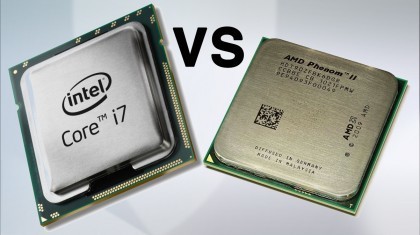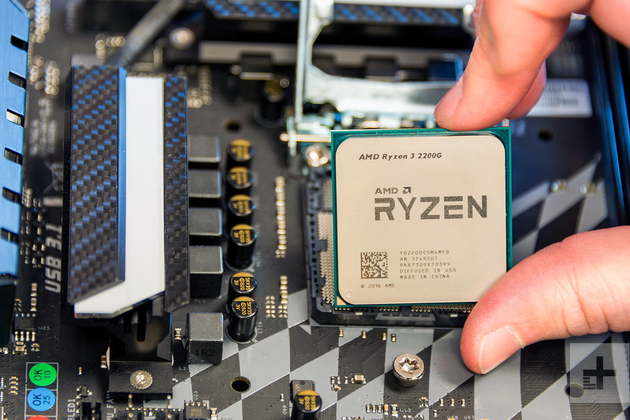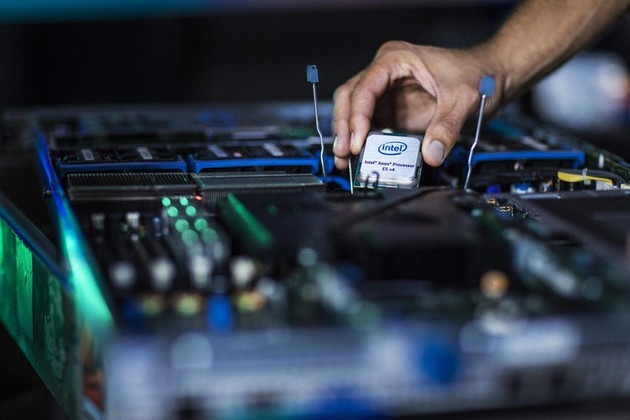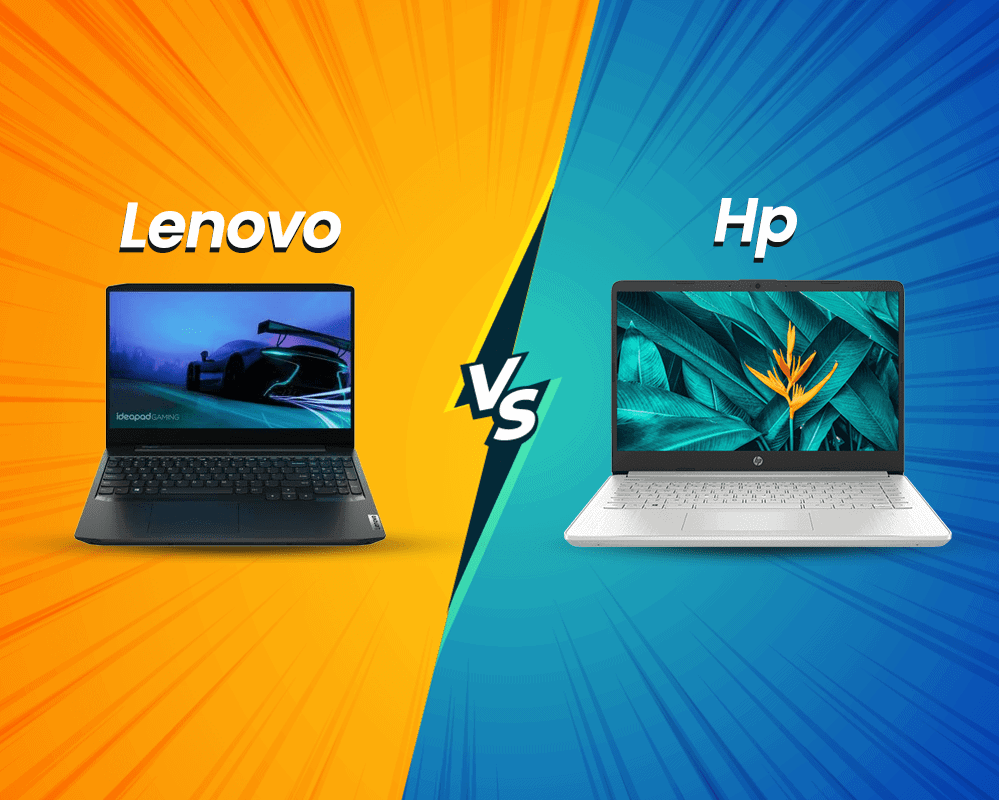It is in the processors that this war begins, two prestigious companies and with incredible evolution. These brands are well known in the digital universe for producing our computer processors and other important hardware.
Most of the market belongs to Intel, AMD is not left behind and has presented us with components with incredible quality and more competitive prices than its competitor.
Price / Quality

It is a theme that we could develop days and days, and never find a concise answer. Most buyers always look for the best price-quality benefit, but we need to know what our real need will be.
The entry-level models Intel achieves offer good options at a low cost, of course for very basic and very limited uses. AMD gives us more expensive solutions and comparable performance.
- Intel Pentium G4560 - Starting at 60 €;
- AMD Athlon 240GE - Starting at 74.90 €.
- Intel Core i5-8600K - Starting at € 269.90;
- AMD Ryzen 5 1600X - Starting at 155 €.
Entering the top range , the Ryzen 7 has a huge processing capacity, behind Intel, in the number of cores. However it is a processor that has all that is needed! It can deliver exceptional performance that could only be compared to an i7, which has a higher cost.
- Intel Core i7-8700K - Starting at 425 €;
- AMD Ryzen 7 2700X - Starting at 329 € .
Gaming

In this universe, there are more differences and components that could make all the difference. Let's not forget that the latest generations of consoles were almost all equipped with an AMD CPU / GPU from both Microsoft and Sony.
Intel achieves great gaming results, even in games designed to work on multiple cores, achieving impressive management of its core's.
In gaming, most of the benchmarks are led by Intel, of course there are titles like the Hitman and Doom series that are developed for an AMD environment. This does not mean that we will have worse game performance when using an Intel processor, the game processing management will be optimized for an AMD architecture.
A processor is not everything, putting together a good graphics we can have a durable machine and a lot of processing capacity. Investing in good graphics is essential to achieving the best results, performance and quality.
An agreement was recently made between the two companies, AMD will provide graphics processors to integrate Intel chipsets. So we get thinner notebooks, higher power and less energy-efficient performance.
Conclusion : The gaming universe is dominated by Intel .
Video rendering

"Heavyweight" applications are preferred by AMD processors. It gives us more cores than its rival, and that makes all the difference.
The professionals rendering using software in the processor, along with the graphics card and RAM, exhausted almost all computer resources. This is where AMD is most efficient.
Visual production, processing and graphics software are tasks that require fast processing, AMD can make these tasks easily and quickly.
The multitasking capability and number of colors allows for different results from your rival and a big difference in compiling our final project.
This is a segment where the budget dictates the final choice, if we have the ability to purchase the high end Intel CPU we should do so. Should it be necessary and possible to save some extra money, AMD offers great solutions at a very inviting and competitive price. We get AMD options at half the price of an Intel i9:
- Intel Core i9-9980XE - Starting at 2189 €;
- AMD Ryzen Threadripper 2950X - Starting at 916 € .
Conclusion: AMD takes the cup in video rendering.
Compatibility and purchase option
As is well known, and said above, Intel leads the merchant and for that very reason we find more motherboard models compatible with the various existing sockets.
Even CPU coolers are more easily assembled and compatible with Intel. Let's also say that with Intel's superiority, they have enough capacity to make a bigger impact on advertising and marketing in the marketplace, and that creates trends.
When choosing the motherboard we must pay attention to the socket, because if you make a mistake, the processor will not be compatible and the attempt to mount can be expensive. Binding pins are extremely sensitive and fragile.
Conclusion: This is perhaps the biggest problem facing AMD and for that very reason I will have to give Intel as the winner.
Overclock
This is not easy to do and we must be very careful when we do it, after all we are "accelerating" the responsiveness of our "brain". It is the CPU that suffers the most when it is overclocked, high voltages and high temperatures affect the proper functioning of the computer.
Both Intel and AMD allow us to fully exploit CPU capacity. AMD has always allowed processors to be accelerated and perform better. Which made the brand known for overclocking extremes and even being ridiculed for the high temperatures, even able to "star an egg".
These defects were hard work and now AMD produces processors with high responsiveness and no overheating issues. The computer, when the temperature is not supported, will shut down without notice to prevent irreversible processor damage. A "feature" that has always accompanied Intel and has now been adopted by AMD.
In the latest releases, Thread-Ripper has been announced which is able to compete with the recently launched i9 range by Intel. The performance is very similar and so I will have to split the cup for both brands.
Conclusion: In the Overclock area the tie is the fairest.
And the big winner is?
It all depends on our use and need, we don't need an i7 or a Ryzen 7 for everyday use, ie surfing the internet, watching movies and series or even a good gaming session. The market allows a wider choice and fair offerings.
- If our budget is short , we recommend AMD for great value for money, more threads and core's. Also because in daily use we will not notice the differences of a Ryzen 5 for an i5 processor.
- If we are more demanding , Intel or AMD are good options, you can always save on some components when buying AMD and use that savings for a higher end component, such as the graphics card. It is a viable option for video and image rendering.
- An ultra demanding user who wants full PC customization, so I highly recommend Intel. It is a market with more options, alternatives and endless possibilities.
There are no winners, both brands are at the top and each has its own environment and segment. Evolution has helped catapult AMD to the top and hopefully this "war" will continue for many years to come, after all, it is the end consumer who wins and the market has fairer prices.
Passionate about understanding and contributing to a world that does not stop changing. New forms of Work, Sustainability and Technology. For many years he has worked as a creative for large international companies. He has a Ph.D. in information technology and he has been doing quantitative research in the interdisciplinary areas of information systems, cyber security, data analytics and artificial intelligence. He continue to look for creative solutions through technology to help companies to be more humane and sustainable..
Leave a reply
Your email address will not be published. Required fields are marked *Recent post

AMD vs. Intel: Understand Processor Differences

What is acrotray.exe? Process / File: acrotray.exe


